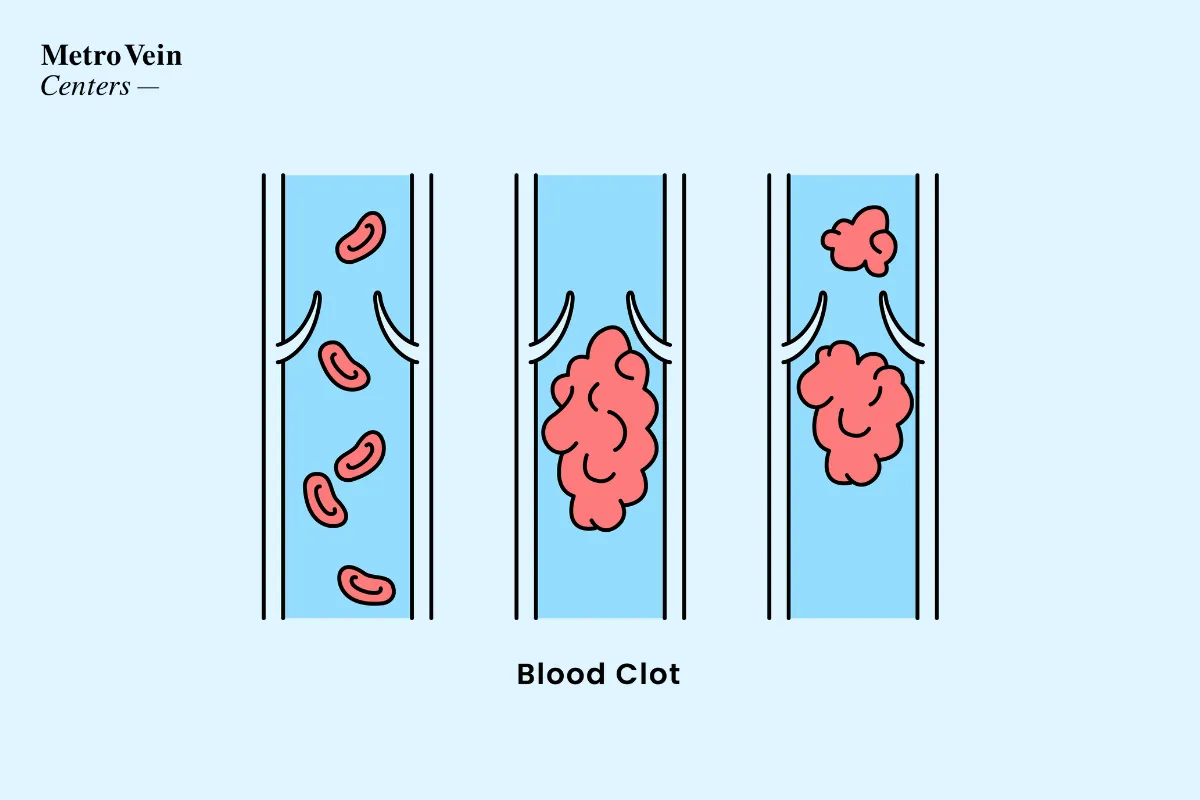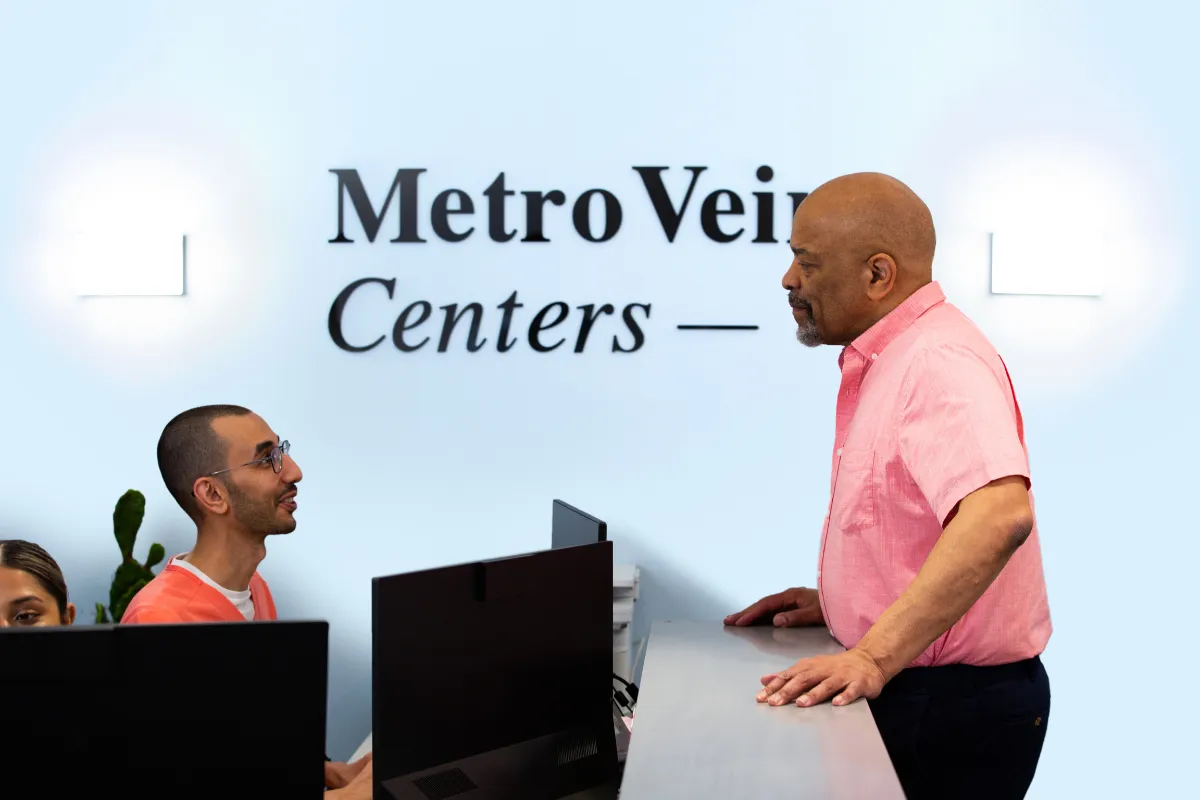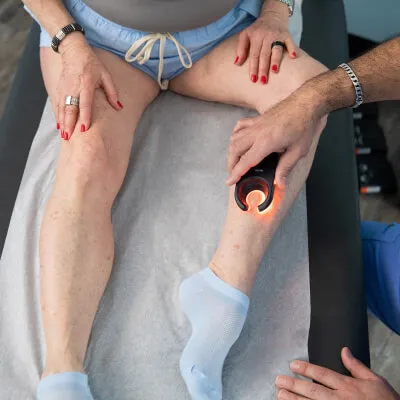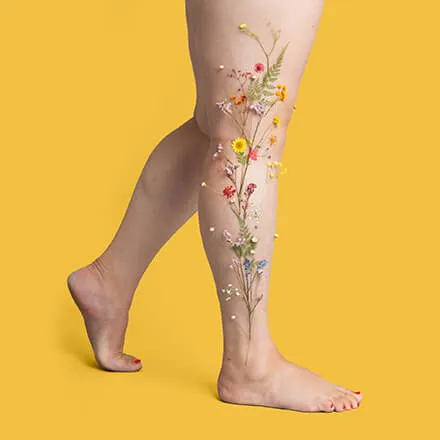Varicose veins, a common vascular condition caused by chronic venous insufficiency (aka vein disease), affect a substantial portion of the global population: As many as 1 in 3 people have them! The presence of bulging, twisted varicose veins is more than simply a cosmetic concern, as most people with this condition suffer from painful and uncomfortable symptoms like restless legs, leg swelling (edema), and cramping legs. As technology and medical advancements continue to progress, a variety of minimally invasive treatment options have emerged -- providing quick, effective solutions for the management of varicose veins. One common concern among prospective patients considering these treatments is the potential risk of developing blood clots. Does vein treatment cause blood clots? Can vein treatment treat blood clots? What is deep vein thrombosis (DVT) and is this the same as blood clots? Does having a vein treatment increase or decrease your risk of developing clots in the future?
We're here to set the record straight. Keep reading to learn more!

Understanding the 2 Types of Blood Clots
The body's circulatory system consists of both arteries, which carry oxygenated blood away from the heart, and veins, which carry deoxygenated blood back to the lungs. Blood clots that form in arteries (arterial thrombosis) may cause heart attacks and strokes, whereas blood clots in the veins are different and significantly less concerning.
Deep Blood Clots: Arteries
Blood clots in the venous system, also called deep vein thrombosis (DVT), are a serious medical concern. Signs of DVT include leg swelling, unexplained leg pain, skin that is warm to the touch, and hard veins under the skin. These symptoms are typically asymmetrical (occuring in only one leg). DVT can form for a variety of reasons, including age, smoking habits, obesity, sedentary lifestyle, and more. DVT is an extremely rare side effect of vein treatment, affecting less than 0.2% of patients. Although it is important to seek medical attention if you notice any symptoms of deep vein thrombosis, DVT is treatable using common medicines such as anticoagulation agents (aka blood thinners).
Superficial Blood Clots: Veins
Blood clots in superficial veins are known as phlebitis, which is not a dangerous blood clot. Phlebitis is the inflammation of a vein on the surface of the skin, and can easily be treated at home with a steroid cream or over-the-counter medicine.
Do Vein Treatments Prevent Blood Clots?
Vein treatments can contribute to the prevention of blood clots, especially when the treatment is aimed at addressing conditions like venous insufficiency or varicose veins. Vein treatments help prevent blood clots by:
-
Improving blood flow: Vein treatments, such as radiofrequency ablation or sclerotherapy, are often performed to correct issues with blood flow in the veins. By improving blood flow, these treatments can help reduce the risk of blood clots. Varicose veins are caused by broken valves in the veins and may increase the risk of clots if left untreated.
-
Reducing stasis: "Stasis" refers to the pooling or stagnation of blood in the veins. Conditions such as chronic venous insufficiency can lead to stasis, increasing the likelihood of blood clot formation. Vein treatments that address these conditions aim to reduce stasis and, in turn, lower the risk of blood clots.
-
Symptom relief: Vein treatments can also relieve symptoms such as swelling, pain, and cramping associated with venous disorders. By addressing these symptoms, the overall risk of blood clots may be reduced.
Do Vein Treatments Cause Blood Clots?
Vein treatments, particularly procedures aimed at addressing varicose veins or venous insufficiency, generally do not cause blood clots. In fact, these treatments are often performed to alleviate symptoms associated with poor vein function and reduce the risk of future complications, including blood clots.
However, like any medical treatment, there can be side effects of vein treatments. It's important to discuss these risks with your vein specialist before undergoing any treatment. In some cases, procedures involving veins may be associated with a temporary increase in the risk of blood clots. These are easily treatable by a trained vein specialist. The overall goal is to improve vein function and circulation in the long term. Overall, vein treatments are incredibly unlikely to cause blood clots, with this complication occurring in less than 0.2% of patients!
That's a relief, right? Let's continue learning why those stats are so low, and what your team of vein specialists does to ensure patient safety when you seek varicose vein treatment in our vein clinics.

Diverse Approaches to Varicose Vein Treatment
Modern advancements in vein care technology now provide a wide variety of treatment options designed to address varicose veins in gentle, efficient ways. Understanding the nuances of these vein treatments will help improve blood circulation and reduce the risk of blood clots in the future.
The first step is always a patient-centric risk assessment. A meticulous evaluation of individual patient factors is a critical component in ensuring the safety of varicose vein treatment. Your vein doctor will conduct a thorough assessment to identify potential risk factors, such as a history of deep vein thrombosis (DVT), obesity or smoking. Patient education is an important part of this discussion -- your doctor will share lifestyle modifications and habits that can further mitigate potential risks. Maintaining open communication between healthcare providers and patients is fundamental in fostering a shared responsibility for overall well-being.
After assessment, your doctor may recommend a vein treatment plan that could include:
Endovenous Laser Ablation (EVLA): This minimally invasive procedure utilizes laser energy to seal off the affected vein. The localized nature of this treatment significantly reduces the risk of blood clots as it is neither a major nor invasive surgery. This gentle outpatient procedure can be completed in under 30 minutes (as is true for all options on this list!).
Radiofrequency Ablation (RFA): Similar to EVLA, RFA employs radiofrequency energy to thermally close the problematic vein. Precision and minimal disruption to surrounding tissues contribute to a low risk profile, making RFA one of the standard building blocks in a comprehensive treatment plan for varicose veins.
Sclerotherapy: This treatment involves injecting a medical foam solution directly into the vein, inducing its closure and gradual disappearance. Because this is a targeted treatment focused on the superficial venous system, there is minimal risk for clot formation.
At Metro Vein Centers, our board-certified vein specialists conduct free vein evaluations and offer comprehensive ultrasound evaluations before and after treatments to evaluate the venous system for signs of blood clots. In the unlikely event that there is concern or warning signs of clot formation in a treated vein, we prescribe a short course of blood-thinning medications and check in regularly until all risk factors have been addressed and eliminated.
If patients begin to experience symptoms of blood clots, our patient care team schedules an immediate check-in to address any and all concerns.

Post-treatment Care
Although the procedural aspects of varicose vein treatments contribute to a low risk of blood clots in and of themselves, post-treatment care plays a pivotal role in minimizing potential complications. Patients are equipped with comprehensive guidelines before leaving the clinic and with telephone check-ins after treatment. After-treatment care includes:
Compression stockings: Provided in-clinic for all varicose vein treatments, graduated compression stockings aid in promoting healthy blood circulation, reducing the likelihood of clot formation. Our specialists recommend 30 mmHgs of compression, and prefer over-the-knee or thigh-high stockings to provide even compression throughout the entire leg for optimal results.
Physical activity: Encouraging light physical activity post-treatment helps maintain optimal blood flow and prevents prolonged periods of immobility. Low-impact exercises like calf raises, swimming, yoga, walking, and more can all help to encourage circulation and prevent the formation of blood clots.
Hydration and lifestyle choices: Putting an emphasis on hydration and adopting a healthy lifestyle (diverse diet and regular exercise) further bolsters the body's resilience against potential complications.

Your Legs Are in Good Hands
The modern options of varicose vein treatments not only provide effective solutions to concerns that are born of and may lead to blood clots, but also prioritize patient safety. The evolution of minimally invasive treatments, patient-centric risk assessments and evaluations, and comprehensive post-treatment care has significantly reduced the likelihood of blood clots as a complication of vein care. Minimally invasive varicose vein treatments stand as a testament to the marriage of medical advancements and a commitment to ensuring the well-being of individuals seeking relief from this common vascular condition.
If you're interested in seeking treatment for painful and uncomfortable symptoms of vein disease such as varicose veins, we've got you covered! We're proud to offer free vein evaluations in all of our New York, New Jersey, Connecticut, Michigan, Texas, and Arizona vein clinics. Our board-certified team of vein specialists provides FDA-approved, minimally invasive vein treatments for both varicose veins and spider veins.
We accept over 200 insurance plans for our varicose vein treatments, and we're happy to speak with your insurance provider directly to ensure you get the maximum coverage possible for your plan. We'll work with you to address your specific concerns and symptoms, and we'll take your lifestyle into account when we customize your vein treatment plan. All of our state-of-the-art vein treatments are performed in under 40 minutes, in our clinics, by our nationally accredited vein doctors. Safe, gentle, and efficient care is only a phone call away. Give us a call at 866-353-5558 to get started on the journey to healthy, happy, clot-free legs!

Metro Vein Centers Editorial Team
From vein care 101 to treatments, the Metro Vein Centers blog offers patients everything they need to know about vein health.

Trusted insight from the nationally accredited, board-certified vein doctors at Metro Vein Centers.







